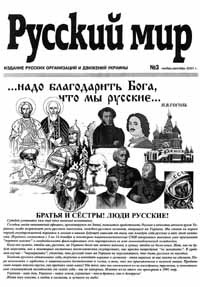With the parliamentary elections not very far off, the new political parties, movements, blocs, groups etc. that are mushrooming on the political landscape are turning to media outlets to make their political agendas known to the public. For example, gearing up for the election the Russian Bloc has begun publishing the Russky mir newspaper described by the editors as “a publication of Russian movements and organizations of Ukraine.” On my table I have the third issue of Russky mir that came out in November, and I will try to share my view of this new publication.
The emergence on the Ukrainian newspaper market of a publication which claims to represent the interests, views, and opinions (to be exact, the pluralism of opinion) of twelve million Ukrainian citizens of Russian descent can only be welcomed. Apparently, the main objective of any law- abiding press publication is to foster interethnic peace (the word mir has several meanings in Russian: one is world and another the absence of conflict or war). Used in the title, mir supposedly indicates a certain commitment on the part of the editors. But what do we see on its front page?
The epigraph to this page is a quotation from Nikolai Gogol (a Ukrainian who wrote his novellas about Ukraine in Russian), “We should thank God that we are Russians.” While we believe that we must thank God, first and foremost, for being the people with no nationality tags attached. Besides, presenting Gogol, who always considered himself a Ukrainian, as a Russian jingoist is not the best idea. But let’s proceed. At the bottom of the page we see the first paragraphs of an address titled, “Brothers and sisters! Russian people!” The incredibly bombastic text that follows is obviously tailored to the patriotic appeals churned out by Russian tsars at times of enemy interventions or long wars.
But who is at war with whom? Make no mistake: with all those accursed nationalists and proponents of ephemeral Ukrainian independence. The style of the appeal is frightening, but the attentive reader will quickly recover from the spell produced by all this drumbeat for war recalling that there is no war on the horizon, only legal parliamentary elections. Unruffled, the authors of the appeal proceed by stating, “Some want the number of Russians in Ukraine to be as small as possible, still better, if there were no Russians at all,” calling up the inevitable vision of a brutal Ukrainian nationalist fighter who sees red and gnashes his teeth at the sight of any Russian book or newspaper, grabs his gun, screaming at the Russians to pack up and go back to Russia.
The authors continue in this same bombastic vein, “Enough of Russians deceiving themselves, being tolerant and hoping for changes for the better. It is time to remember our pride, national dignity, and honor (are Ukrainians denied such rights? Or, maybe, the authors do not regard them as representatives of a great people also worthy of any respect? — Author). To betray one’s nation is as mean as to betray one’s mother.” In the wake of so much of Pharisaic twaddle the following more softly worded calls at the end of the appeal seem nothing but sheer hypocrisy, “Ukraine is our home, Ukraine is our land, we will live together on this land, united by love and harmony, and there can be no better future!” Even hypocrisy has its bounds, and it is simply immoral to mouth such peacemaking verbiage while trying to panic Russian readers with the bugaboos of Ukrainian nationalists and terrorists while spinning yarns about the alleged harassment of the Russian language in Ukraine.
To conclude, I would like to quote from a great Russian linguist and writer Vladimir Dal’ whose 200th birthday anniversary we marked on November 22. He collected tens of thousands of Russian proverbs and sayings, and some of them seem worthwhile recalling here: He who has honey on his tongue, has ice in his heart. You can’t stick dry mud to the wall. Haste makes waste. Thieves like to cry, and swindlers like to pray. And finally, trees are to be judged by their fruit, and people by their deeds. (Incidentally, the articles on religion carried by Russky mir display a distinct xenophobic and anti- Semitic hue, but that would require separate treatment).







